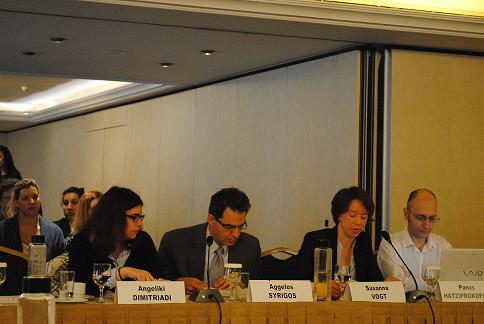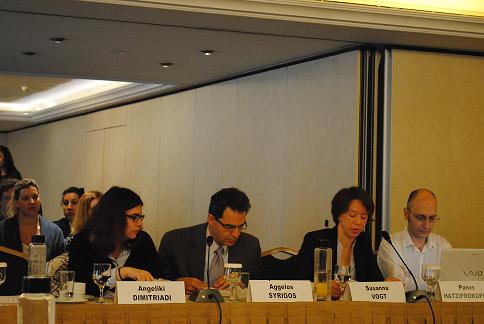A policy workshop on irregular migration and asylum took place on 16 April 2013 inAthens, involving academics, policy makers and practitioners who specialize in various aspects of the topic. The workshop was co-organised by the Konrad-Adenauer-Stiftung (KAS) and the Hellenic Foundation for European and Foreign Policy (ELIAMEP), after the former’s initiative for a collaboration between KAS Athens andAnkaraoffices.
The workshop begun with an overview of the Greek migratory experience and the relevance of irregular migration, the situation at the Greek-Turkish border, population movements in Turkey and the EU dimensions and policies.
Irregularity has been a feature of immigration toGreeceever since the country became a de facto country of destination, in the early 1990s. Although for nearly two decades the bulk of irregular flows occurred through the Albanian border and concerned largely labour migration of Albanian nationals, this has recently changed. Since the second half of the 2000s, the epicentre has shifted to the Greek-Turkish border, originally (2005-2009) through sea routes to the eastern Greek islands, later (2010-2012) at the land border in river Evros, and involves mixed flows of both economic migrants and asylum seekers from a range of Asian and African countries. This coincided with a broader geographic shift of migration flows towards the EU, whereby the largest share of entries cross through Turkey and Greece – partly as an outcome of “fencing” policies in Italy and Spain. At the same time, Dublin II leaves the burden of asylum predominantly in countries of the South. Although, since the second half of 2012, data on irregular migrants’ apprehensions indicate a considerable drop in the flows toGreece, it appears that bothGreeceandTurkeyare two sides of the same coin in respect to migration to the EU, in that they are both inevitably crossed by migrants heading to wealthier northern European countries.
Migration flows to and through Turkey have lately significantly increased and diversified and Turkey emerges also as a country of destination, with its economic growth recently driving partly the liberalisation of visa policies towards third countries. At the same time, readmission procedures have been particularly slow, although there is a readmission agreement in place between the two countries since the early 2000s. In the last couple of years, however, the Greek-Turkish migration management appears to improve, while Turkey is changing its legal system of asylum and migration and the broader framework of migration management coming closer to EU policies. Clearly, the Greek-Turkish border and migration management in both countries become essential for the EU as a whole. Questions of migration management in Turkey are therefore linked to discussions on Turkey’s EU-accession and broader cooperation with the Union.
The EU has been making steps towards the harmonization of migration and asylum policies, officially aiming at improving migration management to make migration an opportunity, potentially beneficial for European societies and with respect to the human rights of the migrants themselves. In that direction, the stated tools of approaching irregular migration focus on establishing a common asylum system, emphasise voluntary returns versus detention and forced repatriations, and call for improved relations with third countries regarding readmissions, in which relationships with Turkey are paramount.
However, return is a complex procedure since countries of origin need to comply. Moreover, the existence of mixed inflows of irregular migrants and asylum seekers/refugees, using often the same channels and the services of the same smugglers, render the management of the border and irregular migration particularly difficult. In addition, the deployment of FRONTEX and the development of EUROSUR suggest a move towards the securitization of EU borders, with significant financial and human costs and questionable effectiveness, considering the likelihood of geographic shifts in channels and routes towards the EU. Among the issues discussed in the workshop therefore was not simply the need for common sets of clear rules and better cooperation within and beyond the EU, but also of long term strategies that take also into account humanitarian issues, as well as labour market trends.
The Greek experience expectedly dominated both presentations and the discussion that followed, especially in respect to the shortcomings of migration and asylum policy in Greece over the recent years, and the concerns arising from the country’s economic crisis at present. The complexity and fluidity of different categories of undocumented migrants were highlighted, regarding not only irregular border crossings, but also, for instance, the latest occurrence of legal immigrants losing their status as a result of losing their jobs. At the same time, asylum management in Greece has been particularly latent, resulting, for instance, in significantly low approval rates, and with serious humanitarian implications. These latter were discussed especially in the context of the recent experience of detention centres in the country, and the controversies over human rights violations, health and hygienic conditions, or the specificities applying to asylum seekers. On the other hand, the recent police operations against undocumented migrants, which are in place since August 2012 under the name “Xenios Zeus”, portrayed as contributing to security especially in downtown Athens, do not seem to pose a realistic solution, given that in many cases arrested and detained migrants are not deportable. Beyond the question of legitimacy and issues of policy and practice inGreecerecently, detention does not appear to be a feasible policy long-term unless it is combined with returns. Specific schemes for voluntary repatriation are in place but involve relatively low numbers of migrants. The New Asylum Service may help towards achieving better results in respect to both broader issues of migration management and for the migrants themselves.





